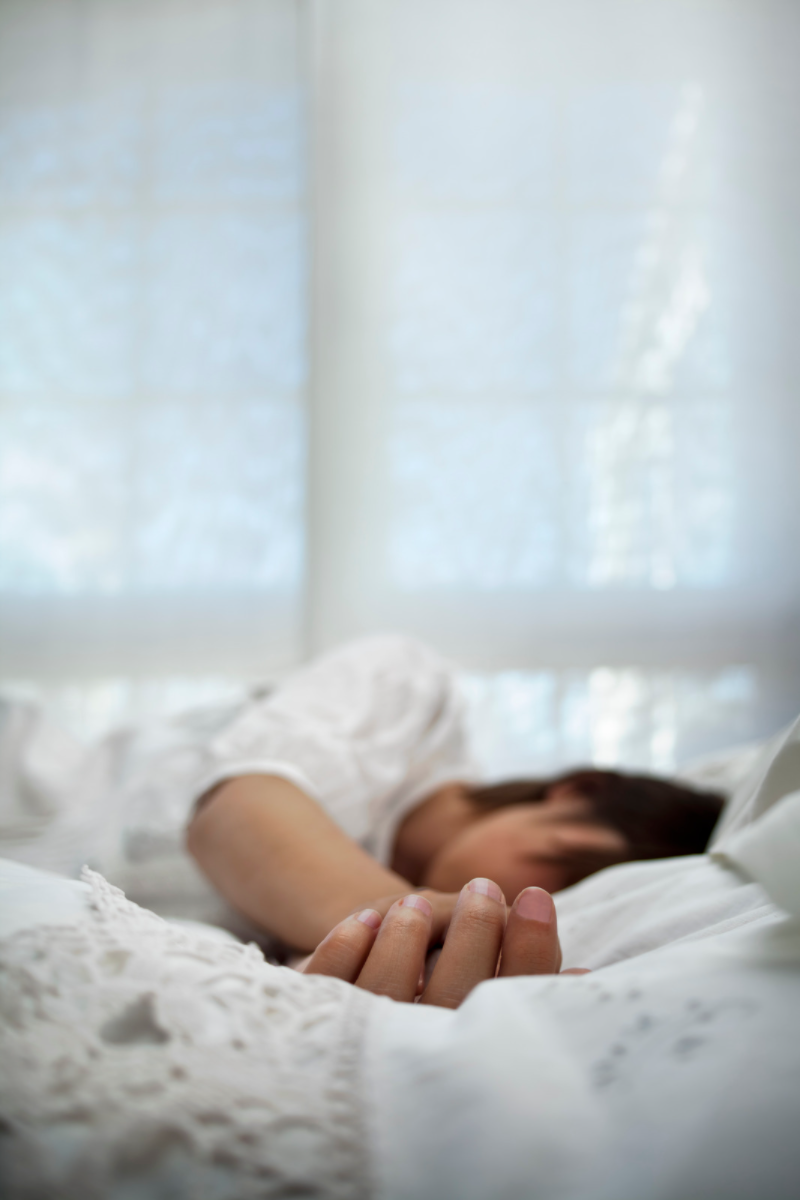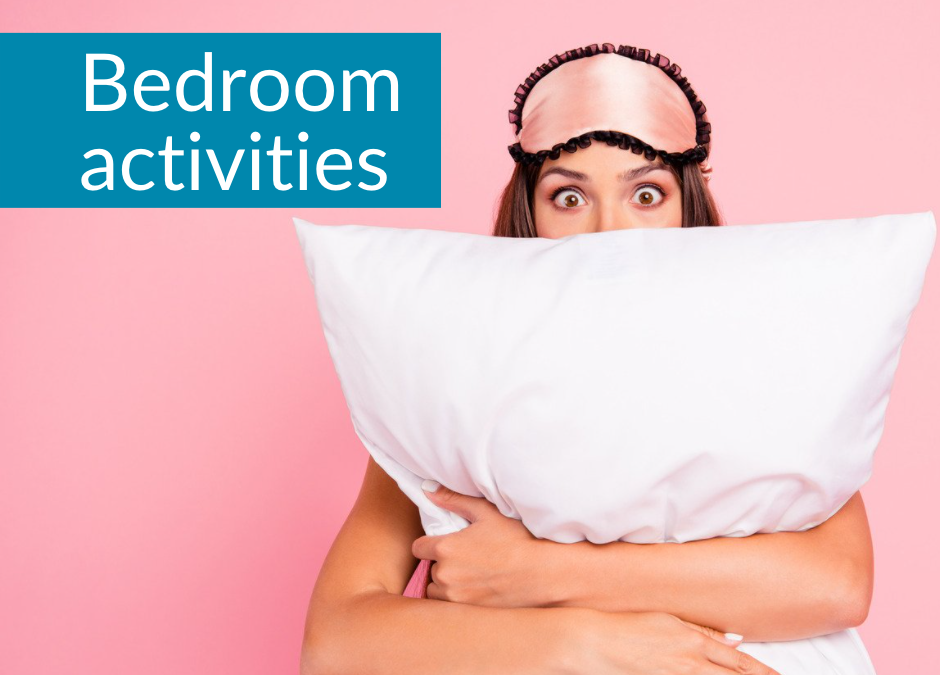Two things you should do in the bedroom, and several you definitely shouldn’t!
Bedroom Activities, what are yours?

According to a recent survey, one in four people admits to working while they’re still in bed. Some people even work in the bedroom!
During the pandemic, when more of us have been working from home, the idea of opening the laptop and answering an email without having to crawl out from under the duvet has been quite tempting. But there are some good reasons why work should be kept out of the bedroom and, in fact, why your bedroom should be reserved for just two things: sex and sleep. Getting a good night’s sleep is crucial for your health and wellbeing. Experts recommend around eight hours every night. Good sleep has a host of health benefits which include:
- Improving your concentration and attention span.
- Helping you to either lose weight and to maintain a healthy weight.
- Strengthening your immune system.
- Helping to prevent heart disease.
- Helping to prevent diabetes.
- Improving mental health
But there are times when getting a good night’s sleep can seem really difficult. If you’re going through a stressful time and have a lot on your mind, you may find that sleep doesn’t come as easily as it once did. If your body clock gets confused, you may find it difficult to sleep. This can happen if you’re jet-lagged, changing shift patterns at work, or keeping irregular sleep patterns for other reasons. It’s better to go to bed and get up at roughly the same time every day, even at the weekends. Although a lie-in might feel like a treat, it might not help your sleep pattern if you stay in bed late every weekend.
If you are interested in more info on how to make more time for yourself and imporve your mental health check out my blog …
Things to avoid if you want to improve your sleep are:
- Looking at screens before sleep.
- Having the temperature in your bedroom too high.
- Working in the bedroom.
- Drinking too much caffeine or alcohol.
- Smoking
- Eating a large meal before bed
Bedroom do’s and don’ts

Keep screens out of the bedroom
This includes tv, a laptop, and even a mobile phone. The blue light emitted reduces the production of melatonin and this can have a devastating effect on your sleep and ultimately on your health. If you have trouble sleeping, try avoiding screens for at least an hour before bedtime and ensure you spend time outdoors during the day. Our bodies and brains need the contrast between light and dark, and spending all day in a dimly lit room will only serve to make you more sensitive to blue lights at night.
Keep the temperature cool
Your body temperature peaks during the middle of the afternoon and then start to fall in preparation for nighttime. This drop in temperature is part of the process which triggers the production of the sleep hormone melatonin. If your bedroom is too warm, this process will be hampered. The ideal temperature is around 18 degrees, although this varies from person to person. If you struggle to get to sleep at night, try taking a cool shower before you go to bed.
Change the sheets regularly
Nothing beats the feeling of climbing into a bed with fresh sheets. Ideally, your bed linen should be changed around once a week. This is especially important if you have pets that sleep on the bed. After just a few nights, your bedding will have acquired a large number of dead skin cells, dirt, sweat, and dust mites.
It may sound disgusting, but there are probably hundreds of thousands of dust mites in your bedding. They live on dead skin cells and while they won’t bite you, they can trigger allergies and skin irritations. They reproduce at a frightening rate, which is why it’s important to change your sheets frequently.
Avoid smoking or drinking too much caffeine or alcohol
Many people believe that an alcoholic nightcap will help them nod off, and while alcohol may indeed make you feel drowsy, it will not help you to get a good night’s sleep as it may interrupt the cycles of sleep during the night or worsen snoring or sleep apnoea. And stimulants such as nicotine and caffeine will also prevent restful sleep, especially if taken too close to bedtime.
Hormones
During sleep, a range of hormones is also released into the body, which helps to regulate not only our sleep and wakefulness, but also our appetite, stress, mood, and libido, which brings us nicely to the benefits of healthy sex life.
Bedroom sex is really good for your health…

Having a good sex life is not only pleasurable but is also good for you. Regular sex improves your immune system. It raises your heart rate and stimulates your muscles, helping to prevent heart disease. One study suggested that men who enjoy regular sex were half as likely to die of heart disease.
Sex also regulates hormones such as estrogen and testosterone, which helps to prevent conditions such as osteoporosis.
A healthy sex life improves your mood and increases your feelings of well-being. Sex eases stress by releasing feel-good hormones, boosting your self-esteem, and alleviating feelings of anxiety.
Another hormone that is released after sex is prolactin. This is the hormone that makes us feel relaxed after sex and can also help us to get a good night’s sleep.
For women, regular sex can help with bladder control because orgasms cause the pelvic floor muscles to contract, which strengthens them and helps to prevent incontinence.
Whilst for men, healthy sex life can help to prevent prostate cancer.
And finally, regular sex can increase your libido. It improves blood flow, vaginal lubrication, and elasticity, which will make sex feel easier and make us want more. So it’s yet another case of ‘use it or lose it’.
So for good health and happiness, remember to reserve your bed for sleep and sex and keep everything else on the other side of the bedroom door!

Book a FREE Curiosity call today
We can cover anything you would like to talk about and explore anything that is worrying you.
Book your place today and we can start your journey to a better future.
Make sure you are following me for all updates,
don’t forget to say hi!


Recent Comments